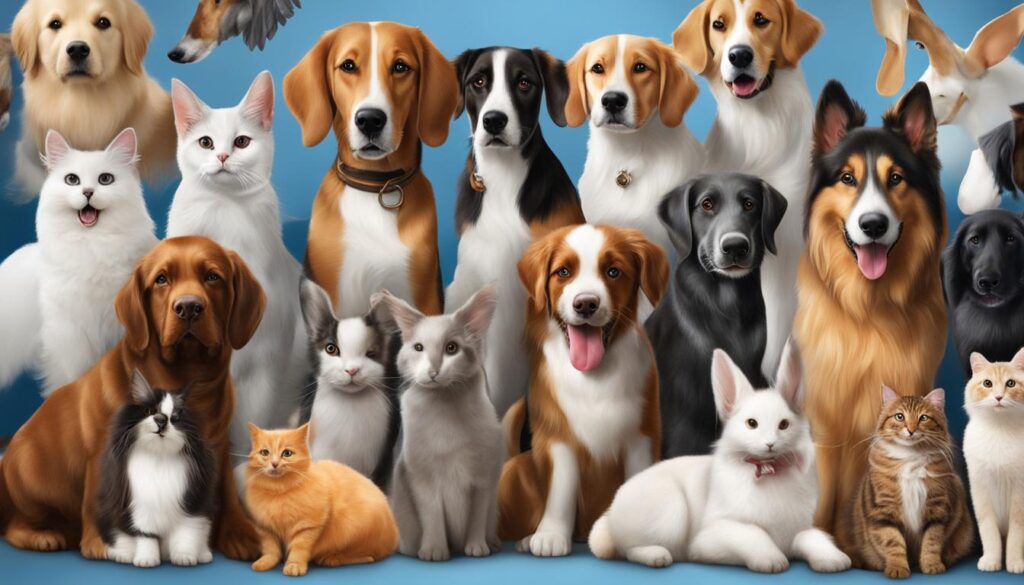Greetings pet owners! As a passionate advocate for pet health and wellness, I am excited to share with you the importance of tailored care for our furry friends. Just like humans, pets have unique needs when it comes to their well-being. From nutrition and exercise to grooming and preventive care, every aspect of their health requires a personalized approach.
In this article, I will guide you through the world of pet care tips, focusing on providing the best possible advice for your beloved companions. Whether you have a dog, cat, bird, or any other cherished pet, you’ll find valuable information that will help you create a customized care routine that suits their specific needs.
From providing pet nutrition advice and exercise tips to promoting holistic health practices and stress management techniques, this article aims to empower you to enhance your pet’s quality of life. We’ll explore topics such as preventive pet care, vaccination guides, dental care advice, and much more. The key is to understand that each pet is unique and requires personalized attention to thrive physically and mentally.
Key Takeaways:
- Tailored care is vital for meeting the unique needs of different pets.
- Providing proper nutrition, exercise, grooming, and preventive care is essential for your pet’s well-being.
- Consider holistic pet healthcare approaches to promote overall wellness.
- Regular veterinary check-ups, vaccinations, and dental care are crucial preventive measures.
- Managing your pet’s stress levels is essential for their mental health.
Understanding the Shift towards Personalized Pet Care
In recent years, there has been a growing demand for personalized pet care experiences. Pet owners want services and products that cater specifically to their pets’ unique needs, preferences, and health conditions. This shift towards personalization is driven by the desire to provide the best possible care for pets, ensuring their optimal health and well-being.
Why Tailored Experiences Are in Demand
Pet owners understand that each pet is an individual with distinct requirements. They recognize that a one-size-fits-all approach to pet care is no longer sufficient. Instead, they are seeking personalized care that takes into account their pets’ specific needs, such as dietary restrictions, medical conditions, activity levels, and behavioral patterns. Personalized pet care allows owners to address these distinctive demands and provide their beloved companions with tailored experiences that promote their overall health and happiness.
Bespoke Products and Services for Every Pet
To meet the increasing demand for personalized pet care, numerous businesses have emerged, offering bespoke products and services for pets. From customized diets formulated to address specific nutritional needs to tailored grooming services designed to cater to individual breeds and coat types, pet owners have access to a wide range of options to meet their pets’ unique requirements. These tailored products and services ensure that pets receive the highest quality care, resulting in improved overall well-being and longevity.
Innovations in Pet Technology Enhancing Animal Well-being
Pet technology has revolutionized the way pet owners care for their furry friends and has significantly enhanced animal well-being. The advent of wearable devices and smart feeding systems has opened up new possibilities for monitoring and improving the health and quality of life of our beloved pets.
Wearable Devices for Real-time Health Monitoring
One of the remarkable advancements in pet technology is the development of wearable devices specifically designed for pets. These devices, such as smart collars and GPS trackers, provide pet owners with real-time information about their pets’ health, activity levels, and location. By wearing these devices, pets’ vital signs, including heart rate, respiration, and body temperature, can be continuously monitored, allowing for early detection of any potential health issues.
With wearable devices, pet owners can easily track their pets’ exercise routines, ensuring they are getting enough physical activity for their breed and age. This information helps pet owners tailor exercise plans suited to their pets’ specific needs, promoting a healthier lifestyle.
Moreover, the ability to monitor pets’ location through GPS trackers ensures their safety, minimizing the risk of getting lost or straying too far from home. These devices give pet owners peace of mind, knowing they can easily locate their pets when needed.

Smart Feeding Systems for Optimal Nutrition
In addition to wearable devices, the development of smart feeding systems has transformed the way pets are fed and nurtured. With these innovative devices, pet owners can provide their pets with optimal nutrition tailored to their specific dietary needs.
Smart feeding systems utilize advanced technologies to dispense the right amount of food at scheduled intervals, ensuring portion control and preventing overfeeding. Some systems even incorporate customizable feeding plans based on a pet’s age, breed, and weight, taking the guesswork out of meal preparation.
These devices also allow pet owners to remotely control and monitor feeding from their smartphones, ensuring that pets are fed on time, even when the owners are away. This feature is particularly beneficial for busy pet owners or those who work long hours.
By incorporating smart feeding systems into their routines, pet owners can ensure their pets receive the nutritional balance they need for optimal health and well-being, reducing the risk of obesity and related health issues.
With the continuous advancements in pet technology, the well-being of our furry companions can now be closely monitored and enhanced. Wearable devices and smart feeding systems provide pet owners with valuable insights into their pets’ health and nutrition, allowing for proactive and personalized care.
Pet Care Goes Green: The Rise of Sustainable Practices
As sustainability becomes an increasingly important consideration in various industries, including pet care, there has been a rise in the adoption of sustainable practices. Pet owners are seeking eco-friendly products that minimize their pets’ carbon footprint while still providing high-quality care.
Eco-friendly Products for Every Pet’s Lifestyle
One way pet owners can embrace sustainable pet care is by using eco-friendly pet products. These products are designed with the environment in mind, using materials and manufacturing processes that have a reduced impact on the planet. From biodegradable pet waste bags to organic and non-toxic pet shampoos, there are numerous options available to support a green pet care routine. By opting for eco-friendly products, pet owners can minimize their pets’ exposure to harmful chemicals and reduce their contribution to landfill waste.
Environmental Responsibility in the Pet Care Industry
It’s not just pet owners who are recognizing the importance of sustainable practices. The pet care industry as a whole is embracing environmental responsibility. Companies are prioritizing sustainable sourcing of ingredients, using renewable energy in their manufacturing processes, and implementing eco-friendly packaging solutions. By promoting sustainable practices, the industry is working towards a greener future for pet care, ensuring that the well-being of pets goes hand in hand with the well-being of the planet.
By adopting sustainable pet care practices and using eco-friendly pet products, pet owners can minimize their environmental impact and contribute to a more sustainable future. Embracing sustainable pet care not only benefits the planet but also promotes the health and well-being of our beloved animal companions.
Pet Health and Wellness Tips for Distinctive Demands
When it comes to the health and wellness of our beloved pets, one size does not fit all. Each pet has unique needs and requirements that must be addressed to ensure their well-being. In this section, I will provide you with expert tips and advice to help you navigate the various aspects of pet care, from nutrition and exercise to grooming and mental health. By following these pet health tips, you can help your furry friend live a happy and healthy life.
Pet Nutrition: Proper nutrition is the foundation of good pet health. It’s important to provide your pet with a balanced and nutritious diet that meets their specific needs. Consult with your veterinarian to determine the appropriate type of food and portion size for your pet’s age, breed, and any specific health conditions they may have. Remember to always provide fresh water and avoid feeding your pet harmful human foods.
Pet Exercise: Regular exercise is essential for maintaining your pet’s physical and mental well-being. The amount and type of exercise needed can vary depending on your pet’s breed, age, and overall health. Engage in activities that match your pet’s energy level and interests. Whether it’s going for walks, playing fetch, or providing interactive toys, find ways to keep your pet active and stimulated.
Pet Grooming: Grooming is not just about keeping your pet looking good; it also plays a crucial role in their overall health. Regular brushing helps remove loose hair, prevents matting, and promotes healthy skin and coat. Additionally, keep your pet’s nails trimmed, ears clean, and teeth brushed regularly to prevent dental issues. If you’re unsure about the proper grooming techniques for your pet, consult a professional groomer.
Pet Mental Health: Just like humans, pets can experience stress and anxiety. Providing a nurturing and stimulating environment is essential for their mental well-being. Spend quality time with your pet, engage in interactive play, and provide them with toys and puzzles that challenge their minds. Creating a routine and ensuring a calm and safe space for your pet can also contribute to their mental health.
Pet Preventive Care: Prevention is key when it comes to avoiding common health issues in pets. Regular veterinary check-ups, vaccinations, and parasite prevention are essential for maintaining your pet’s health. Follow your veterinarian’s recommendations for preventive care based on your pet’s age, breed, and lifestyle. Early detection and treatment of potential health problems can save both you and your pet from unnecessary stress and expenses.
By incorporating these pet health and wellness tips into your daily routine, you can provide the best possible care for your furry friend. Remember, every pet is unique, and it’s essential to customize their care to meet their distinctive demands.

Lafayette Companion Animal Hospital’s Comprehensive Care
Lafayette Companion Animal Hospital is a renowned veterinary hospital that provides comprehensive pet care services in Boulder County and the surrounding areas. We are committed to meeting the unique needs of every pet that comes through our doors, offering a wide range of services tailored to their individual requirements.
Full-range Medical Services for Diverse Animal Species
At Lafayette Companion Animal Hospital, we understand that pets come in all shapes and sizes, and each species has its own specific health concerns. That’s why we offer a full range of medical services to cater to the diverse needs of different animal species. Whether you have a dog, cat, bird, reptile, or any other exotic pet, our experienced team of veterinarians is equipped to provide the specialized care your pet deserves.
Expert Grooming and Behavioral Services for Exotic Pets
In addition to our comprehensive medical services, we also offer expert grooming and behavioral services for exotic pets. Our skilled groomers have extensive experience working with a variety of exotic species, ensuring that your pet receives the highest quality grooming in a safe and stress-free environment. We understand the unique grooming requirements of exotic pets and are dedicated to providing them with the care they need to look and feel their best.
Whether your pet needs a routine check-up, dental care, surgery, vaccinations, grooming, or behavioral support, trust Lafayette Companion Animal Hospital to deliver exceptional care that is tailored to their specific needs. We are committed to providing comprehensive pet care to ensure the well-being and happiness of your beloved companion.
Expanding Horizons with Telemedicine for Pets
Telemedicine has revolutionized the field of veterinary care, allowing pet owners to access convenient and accessible medical services for their beloved companions. Through telemedicine, pet owners can now enjoy the benefits of virtual veterinary consultations, a new frontier in veterinary care.
Virtual Consultations: A New Frontier in Veterinary Care
The advent of virtual consultations has transformed the way pet owners interact with veterinarians. With telemedicine, pet owners can schedule appointments and consult with veterinary professionals remotely, eliminating the need for in-person visits. This saves time and reduces the stress associated with traveling to a veterinary clinic, both for pets and their owners.
Virtual consultations offer a range of benefits, including:
- Convenience: Pet owners can consult with veterinarians from the comfort of their homes, eliminating the hassle of travel and waiting rooms.
- Accessibility: Virtual consultations make veterinary care more accessible to those who live in remote areas or have limited mobility.
- Reduced Stress: Pets often feel anxious or uncomfortable during visits to the veterinary clinic. With virtual consultations, pets can stay in their familiar environment, reducing stress levels.
- Continuity of Care: Virtual consultations allow veterinarians to provide ongoing care and monitoring, ensuring consistent and personalized treatment for pets.
Whether seeking advice on minor health concerns or discussing ongoing treatment plans, virtual consultations offer a convenient and efficient solution for pet owners.
Access to Specialist Services through Telemedicine
In addition to virtual consultations with general practitioners, telemedicine provides access to specialist services for pets. Pet owners can consult with veterinary specialists, including dermatologists, cardiologists, and behaviorists, through teleconferencing and digital communication.
Specialist services through telemedicine offer various advantages:
- Expertise: Pet owners can consult with specialists who have specialized knowledge and experience in their respective fields.
- Convenience: Accessing specialist services through telemedicine eliminates the need for long-distance travel and extensive waiting times.
- Collaborative Care: Telemedicine enables collaboration between general practitioners and specialists, ensuring comprehensive and integrated care plans for pets.
- Enhanced Treatment Options: Through telemedicine, pet owners have access to a broader range of treatment options, including advanced procedures and therapies.
The use of telemedicine in veterinary care has opened new doors for pet owners, allowing them to navigate the world of pet healthcare with convenience, accessibility, and expert guidance.
Specialized Nutritional Guidance for Every Stage of Life
Proper nutrition is essential for pets at every stage of life, and providing them with a diet that meets their unique needs is crucial for their overall health and well-being. Specialized pet nutrition can help pet owners navigate the complexities of pet diets and ensure that their furry friends receive the optimal nutrition they require.
Pet Nutrition Advice for Puppies, Adults, and Senior Pets
One of the key aspects of specialized pet nutrition is tailoring the diet to the specific life stage of the pet. Puppies have different nutritional needs than adult pets, and senior pets require a diet that supports their aging bodies. By understanding the nutritional requirements of each stage, pet owners can make informed decisions about the type and amount of food to provide.
For puppies, a balanced diet that supports growth and development is essential. This includes providing appropriate levels of protein, vitamins, and minerals to promote healthy bone and muscle development. It’s also important to ensure that the diet is easily digestible for puppies, as their digestive systems are still developing.
Adult pets have different nutritional needs, depending on their breed, size, and activity level. It’s important to provide a balanced diet that includes all the essential nutrients they need for optimal health. This can vary based on factors such as energy requirements, weight management, and any underlying health conditions.
As pets age, their nutritional needs change. Senior pets may require fewer calories to prevent weight gain and avoid putting excess strain on their joints. Additionally, diets rich in antioxidants and joint-supporting nutrients can help manage age-related conditions and promote overall wellness.
Custom Diet Plans Based on Genetic Predispositions
In addition to considering the life stage of the pet, specialized pet nutrition can also take into account genetic predispositions. Some breeds are more prone to certain health conditions, such as obesity, joint problems, or allergies. By understanding these genetic predispositions, pet owners can work with veterinarians or animal nutritionists to develop custom diet plans that address these specific concerns.

These custom diet plans may include specific ingredients or formulations that help mitigate the risks associated with genetic predispositions. For example, a diet designed for an overweight or obese pet may focus on weight management and portion control, while a diet for a breed prone to joint issues may include ingredients that support joint health and mobility.
By tailoring the diet to the individual needs of the pet, specialized pet nutrition can help optimize their health, prevent potential health issues, and enhance their overall quality of life.
| Pet Life Stage | Key Nutritional Considerations |
|---|---|
| Puppies |
|
| Adults |
|
| Senior Pets |
|
| Genetic Predispositions |
|
Ensuring Mental and Physical Stimulation Through Pet Exercise
Exercise is crucial for the overall health and well-being of our pets. It not only helps them stay physically fit but also ensures their mental stimulation and cognitive development. Different breeds and temperaments require varying levels and types of exercise to keep them happy and healthy.
Pet Exercise Tips for Different Breeds and Temperaments
When it comes to exercising our pets, it’s important to consider their specific needs and characteristics. Here are some pet exercise tips based on different breeds and temperaments:
- High-energy breeds: Breeds such as Border Collies, Dalmatians, and Australian Shepherds have a lot of energy to burn. Engage them in activities that involve running, fetching, and agility exercises. Long walks, hiking, and interactive games will help keep them happy and tired.
- Medium-energy breeds: Breeds like Labradors, Golden Retrievers, and Beagles fall into this category. They require regular exercise, but not as intense as high-energy breeds. Daily walks, playing fetch, and swimming are great options for them.
- Low-energy breeds: Breeds such as Bulldogs, Pugs, and Basset Hounds have lower energy levels and are prone to weight gain. Short walks, gentle play sessions, and mentally stimulating activities like puzzle toys are ideal for them.
- Small and toy breeds: Small and toy breeds like Chihuahuas, Shih Tzus, and Pomeranians have small bodies but still need exercise. Short walks, indoor play sessions, and interactive toys designed for small dogs are perfect for them.
- Anxious or shy pets: Some pets may have anxiety or be more introverted. Engaging them in low-impact exercises like gentle walks, obedience training, and interactive play with their favorite toys can help build their confidence and comfort level.
Interactive Toys and Games for Cognitive Development
In addition to physical exercise, mental stimulation is crucial for our pets’ cognitive development and overall well-being. Interactive toys and games provide mental challenges and engage their natural instincts. Consider incorporating the following toys and games into your pet’s routine:
- Puzzle toys: These toys require pets to figure out how to obtain a treat or solve a puzzle, providing mental stimulation and reward.
- Treat-dispensing toys: These toys hold treats inside, motivating pets to problem-solve and work for their reward.
- Interactive hide-and-seek games: Hide treats or toys around the house and encourage your pet to find them using their sense of smell and memory.
- Obedience training: Teach your pet tricks and commands, challenging their minds and fostering a stronger bond between you.
Remember to always supervise your pet during playtime and choose toys that are safe and appropriate for their size and breed. Regular exercise and mental stimulation will not only keep your pet physically fit but also contribute to their overall happiness and well-being.

Preventive Pet Healthcare: A Staple for Pet Longevity
Preventive healthcare plays a crucial role in ensuring the longevity of our beloved pets. By prioritizing regular check-ups and vaccinations, pet owners can take proactive measures to safeguard their furry friends’ well-being. Routine veterinary visits provide opportunities for early detection and intervention, mitigating potential health issues and reducing the risk of future complications.
Routine Check-ups and Vaccinations as Preventive Measures
Regular check-ups are vital in maintaining a pet’s overall health. During these routine visits, veterinarians conduct thorough physical examinations, assess the pet’s vital signs, and check for any signs of illness or abnormalities. These check-ups enable early identification and treatment of potential health issues, preventing them from progressing into more serious conditions.
Vaccinations are another fundamental aspect of preventive pet healthcare. They protect pets from contagious diseases and help establish herd immunity within the animal population. Vaccines stimulate the pet’s immune system to recognize and defend against specific infections, reducing the risk of contracting and spreading diseases.
By adhering to a recommended vaccination schedule tailored to their pet’s needs, owners can ensure that their furry companions are well-protected. Vaccinations not only safeguard individual pets but also contribute to the overall well-being of the community’s animal population.
Early Detection of Health Issues to Avoid Future Complications
Early detection is key to addressing potential health issues before they escalate into more significant problems. During routine check-ups, veterinarians may conduct diagnostic tests, such as blood work, urine analysis, or imaging, to screen for underlying issues that may not yet be symptomatic.
Identifying health concerns at an early stage allows for swift intervention, increasing the chances of successful treatment and minimizing the impact on a pet’s quality of life. With early detection, veterinarians can develop tailored treatment plans that cater to the specific needs of each pet, maximizing the likelihood of positive outcomes.
Moreover, routine check-ups also provide an opportunity for pet owners to discuss any concerns or observations they may have. Open communication with veterinarians ensures that no detail is overlooked and that all aspects of a pet’s health are addressed comprehensively.
Overall, preventive pet healthcare, encompassing regular check-ups and vaccinations, is crucial for promoting pet longevity and well-being. By staying proactive and vigilant, pet owners can provide their furry companions with the best possible care, helping them lead healthy and fulfilling lives.
Conclusion
The Vital Role of Customized Care in Pet Longevity and Happiness
Embracing the Future of Tailored Health Care for Our Animal Companions
In conclusion, tailored and personalized care plays a vital role in the longevity and happiness of pets. By understanding and meeting each pet’s unique needs, pet owners can ensure their furry friends live healthy and fulfilling lives.
This focus on customized care is not only beneficial for individual pets but also reflects the future of pet care. As technology advances and our understanding of pet health deepens, the potential for tailored health care will continue to expand. Pet owners can embrace this future by partnering with trusted veterinary professionals and staying informed about the latest developments in customized pet care.
By prioritizing customized care and providing their pets with personalized attention, pet owners can enhance the well-being, longevity, and overall happiness of their beloved animal companions.
FAQ
What are some pet health and wellness tips I can follow?
Pet health and wellness tips include ensuring a balanced diet, regular exercise, proper grooming, stress management, preventive healthcare measures, and maintaining regular veterinary check-ups.
How can I provide the best nutrition for my pet?
To provide optimal nutrition for your pet, consult with a veterinarian for specialized advice based on your pet’s age, breed, and individual needs. They can recommend the appropriate diet and feeding schedule.
What kind of exercise should I provide for my pet?
The exercise needs of pets vary depending on their breed and temperament. Consult with a veterinarian to determine the most suitable exercises for your pet’s needs, whether it’s vigorous activities for high-energy breeds or gentle activities for more laid-back pets.
How can I ensure my pet’s preventive care?
Regular veterinary check-ups and vaccinations are essential for preventive care. These visits allow for the early detection and treatment of potential health issues and help reduce the risk of future complications.
How can I groom my pet effectively?
Proper grooming includes regular brushing, bathing, nail trimming, and dental care. Consult with a professional groomer or veterinarian for specific grooming tips tailored to your pet’s breed and needs.
How can I manage my pet’s stress?
Managing pet stress involves creating a calm environment, providing mental stimulation, ensuring regular exercise, and considering natural remedies or behavioral training if necessary. Consult with a veterinarian for additional stress management tips.
What vaccinations are essential for my pet?
The necessary vaccinations depend on your pet’s species, age, and lifestyle. Consult with a veterinarian to determine the appropriate vaccination schedule and essential vaccines for your pet.
How important is dental care for my pet?
Dental care is crucial for pet health. Regular brushing, dental check-ups, and professional cleanings can help prevent dental diseases and maintain your pet’s oral hygiene. Consult with a veterinarian for specific dental care advice for your pet.
What is holistic pet healthcare?
Holistic pet healthcare focuses on a comprehensive and integrative approach to pet health, considering the physical, mental, and emotional well-being of pets. It often includes natural remedies, alternative therapies, and preventive care.
How can I ensure my pet’s mental well-being?
To promote your pet’s mental well-being, provide mental stimulation through interactive toys, games, and puzzle feeders. Spending quality time together, obedience training, and maintaining a consistent routine can also contribute to their mental health.
Source Links
- https://www.lafayettepetvet.com/site/home
- https://allianceanimal.com/
- https://gmo-research.com/news-events/articles/future-pet-care

